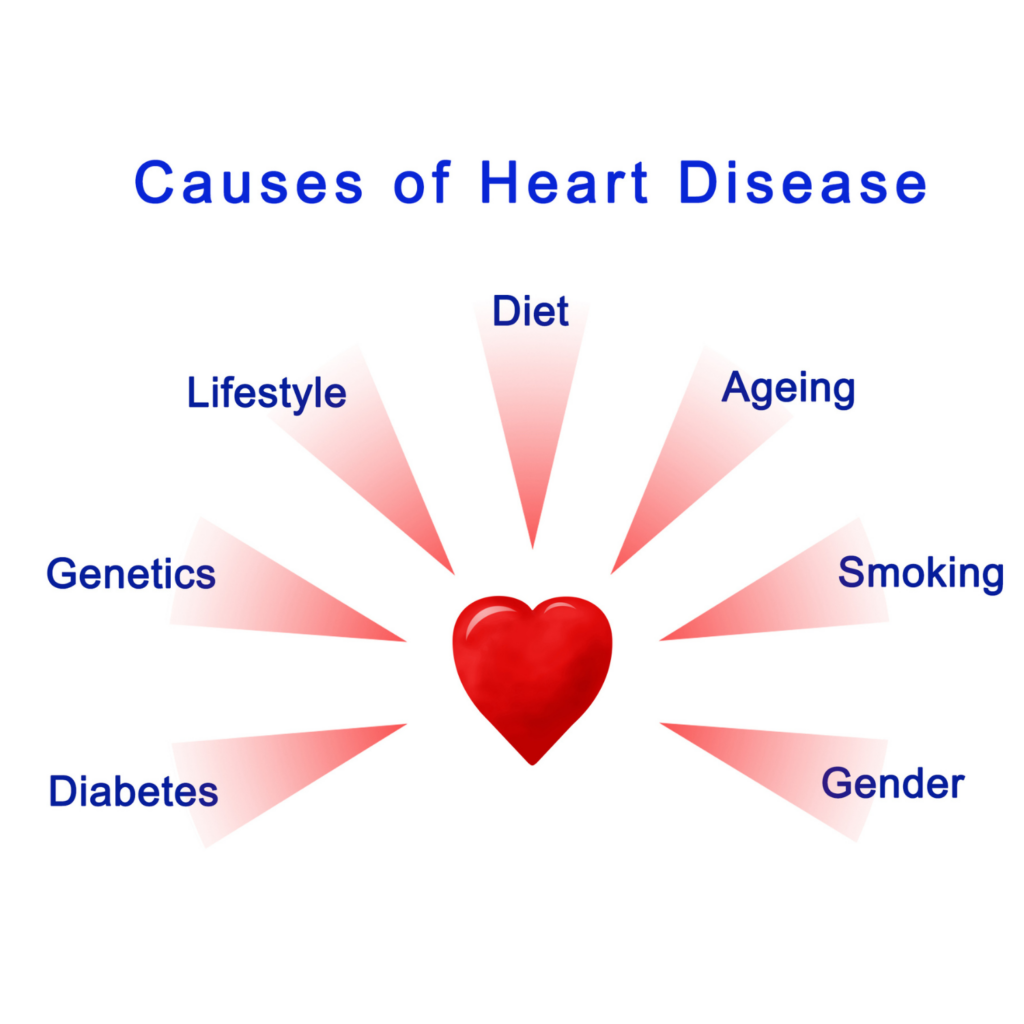Heart Disease and Menopause: A Critical Connection
Heart disease is the leading cause of death for women, claiming more lives than all cancers combined. Yet, many women don’t realize how significantly menopause can impact their cardiovascular health. Declining estrogen levels during menopause play a crucial role, as this hormone helps maintain flexible blood vessels, regulate cholesterol, and reduce inflammation. Without estrogen’s protective effects, the risk of heart disease increases – making heart health during menopause a priority.
February is Heart Health Month, a time to reflect on how we care for our hearts. By understanding the connection between menopause and cardiovascular health, and adopting small, consistent habits, you can protect your heart and thrive during this stage of life. This guide will explain the link between menopause and heart health, outline risk factors, and provide five actionable steps to strengthen your heart.

The Link Between Menopause and Heart Health
Menopause and heart health are closely connected due to the hormonal changes women experience during this phase. Estrogen, a hormone that supports cardiovascular wellness, begins to decline, leading to several physiological changes:
- Higher LDL (“bad”) cholesterol levels and lower HDL (“good”) cholesterol levels.
- Reduced blood vessel flexibility, increasing blood pressure risk.
- Increased inflammation and plaque buildup in the arteries.
This hormonal shift, combined with lifestyle changes and aging, creates unique challenges for cardiovascular wellness. While these changes are natural, understanding their impact empowers you to take proactive steps to protect your heart.

Risk Factors for Heart Disease During Menopause
Approximately two out of three women have one or more risk factors for heart disease. While hormonal changes during menopause increase risk, other lifestyle and biological factors play a significant role.
Key risk factors
- Hormonal changes: Declining estrogen reduces its protective effects on blood vessels, cholesterol regulation, and inflammation control.
- High blood pressure: Aging and menopause can reduce blood vessel elasticity, increasing blood pressure risk.
- Cholesterol levels: Higher LDL and lower HDL cholesterol levels contribute to artery blockages.
- Weight gain: Hormonal fluctuations often lead to abdominal weight gain, which is closely linked to heart disease risk.
- Insulin resistance: Metabolic changes during menopause can raise insulin resistance, increasing the likelihood of type 2 diabetes – a major heart disease contributor.
- Lifestyle factors:
- Chronic stress: Elevated cortisol levels strain the heart over time.
- Sedentary habits: Lack of regular movement weakens the heart and reduces circulation.
- Smoking and excess alcohol: Both habits significantly damage the cardiovascular system.
While some risk factors are unavoidable, many can be managed with small, intentional lifestyle adjustments. Let’s explore how to take control of your heart health during menopause.
5 Ways to Prioritize Heart Health During Menopause
Heart health during menopause doesn’t require drastic measures – small, sustainable changes can have a profound impact. Here are five practical steps to support your cardiovascular wellness:

1. Stay active with gentle, regular movement
Regular movement is one of the most effective ways to improve heart health. It strengthens your heart, enhances circulation, lowers blood pressure, and reduces stress.
- Start small: Aim for 30 minutes of activity, 5 days a week. Activities like brisk walking, yoga, swimming, or even dancing are excellent choices.
- Break it up: If 30 minutes feels overwhelming, divide it into three 10-minute sessions throughout the day.
Quick tip: Choose activities you enjoy to make exercise sustainable and fun. For more ideas, check out my blog post, Why and How to Move Your Body More. It’s full of practical ideas to help you get started and stay consistent.

2. Nourish your heart with healthy foods
Your diet plays a vital role in heart health during menopause. Choosing nutrient-rich, anti-inflammatory foods supports your cardiovascular system while reducing your risk of heart disease.
Foods to include:
- Omega-3 fatty acids: Found in salmon, walnuts, flaxseeds, and chia seeds, these help reduce inflammation and support heart health.
- Fiber-rich options: Beans, lentils, whole grains, and leafy greens help lower cholesterol.
- Antioxidants: Berries, dark chocolate (70% cacao or higher), and green tea combat inflammation.
Foods to avoid:
- Refined oils: Canola, soybean, and corn oils contribute to inflammation. Use cold-pressed olive oil or avocado oil instead.
- Refined sugars: Excess sugar can lead to weight gain and insulin resistance.
- Highly processed foods: Packaged snacks and meals often contain unhealthy fats and sodium.
Quick tip: Swap processed snacks for whole food alternatives like raw nuts or fruit, and season meals with herbs like garlic or turmeric instead of salt. For more ideas on heart-healthy eating, check out my blog post, Healthy Eating Foundations, which offers practical tips to help you make lasting changes.

3. Manage stress to protect your heart
Chronic stress increases cortisol levels, leading to inflammation, higher blood pressure, and an increased risk of heart disease. Reducing stress not only benefits your emotional well-being but also directly impacts your cardiovascular health.
How to reduce stress:
- Deep breathing: Practice the 4-7-8 technique: inhale for 4 seconds, hold for 7, and exhale for 8. Repeat 3 – 4 times.
- Mindfulness or meditation: Spend 5 – 10 minutes focusing on the present moment. Apps like Calm or Insight Timer can help.
- Journaling: Writing for just 5 minutes a day can clear mental clutter and reduce stress.
Quick tip: Combine stress relief with movement by taking a walk in nature or practicing yoga. For more inspiration, check out the Relax pillar section of my blog post, Pillars of Health Part 1 , which dives into practical ways to make relaxation a part of your daily life.

4. Stay hydrated throughout the day
Proper hydration is essential for maintaining healthy blood flow and supporting your cardiovascular system.
- Daily goal: Aim for 6–8 cups of water, increasing your intake if you consume caffeine.
- Start strong: Begin your day with a glass of water before coffee, and carry a reusable water bottle to stay hydrated.

5. Monitor your numbers regularly
Keeping track of key health metrics helps you stay proactive about your heart health during menopause.
Key metrics to track:
- Resting heart rate (RHR): A healthy range is 60–100 beats per minute.
- Blood pressure: Use a home monitor to keep an eye on hypertension risks.
- Activity levels: Track steps or exercise intensity using a wearable device.
Quick tip: Don’t obsess over daily fluctuations. Focus on patterns and staying consistent.
Empowering Your Heart Health Journey
Menopause brings physical changes that can feel overwhelming, but it’s also an opportunity to take control of your heart health. By understanding the impact of menopause on your cardiovascular system and adopting small, consistent habits, you can protect your heart and thrive during this stage of life.
Whether it’s through regular movement, nourishing foods, stress management, hydration, or monitoring your health numbers, each step you take strengthens your foundation for long-term wellness. Remember, heart health during menopause is not just about reducing risks – it’s about empowering yourself to feel stronger, more balanced, and ready for the future.
Start Your Heart Health Journey Today
Ready to take the first step? Download my free Menopause Balance Checklist for simple, heart-healthy habits that fit seamlessly into your busy life. Download it here and take the guesswork out of where to start!















+ Show / Hide Comments
Share to: